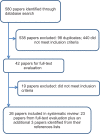Coronary heart disease and household air pollution from use of solid fuel: a systematic review
- PMID: 27151956
- PMCID: PMC4973663
- DOI: 10.1093/bmb/ldw015
Coronary heart disease and household air pollution from use of solid fuel: a systematic review
Abstract
Background: Evidence is emerging that indoor air pollution (IAP) from use of solid fuels for cooking and heating may be an important risk factor for coronary heart disease (CHD).
Sources of data: We searched the Ovid Medline, Embase Classic, Embase and Web of Science databases from inception through to June 12, 2015, to identify reports of primary epidemiological research concerning the relationship of CHD to IAP from solid fuel, the likely magnitude of any increase in risk, and potential pathogenic mechanisms.
Areas of agreement: The current balance of epidemiological evidence points to an increased risk of CHD from IAP as a consequence of using solid, and especially biomass, fuels for cooking and heating. Relative risks from long-term exposure could be 2- to 4-fold.
Areas of controversy: The evidence base is still limited, and although an association of CHD with such IAP from solid fuel is consistent with the known hazards from smoking, environmental tobacco smoke and ambient air pollution, and supported by evidence of effects on inflammatory processes, atherosclerosis and blood pressure, it requires confirmation by larger and more robust studies.
Growing points: The completion of two relatively small case-control studies on CHD and IAP from use of biomass fuel demonstrates the feasibility of such research, and is an encouragement to further, larger studies using similar methods.
Areas timely for developing research: The need for such research is particularly pressing because the incidence of CHD in developing countries is rising, and IAP may interact synergistically with the risk factors that are driving that increase. Furthermore, relatively cheap methods are available to reduce IAP from use of solid fuels, and there are indications from intervention studies that these may impact beneficially on CHD as well as other diseases caused by such pollution.
Keywords: biomass; cardiovascular disease; coronary heart disease; household air pollution; indoor air pollution; solid fuel.
© The Author 2016. Published by Oxford University Press. All rights reserved. For permissions, please e-mail: journals.permissions@oup.com.
Figures
References
-
- Murray CJ, Vos T, Lozano R, et al. . Disability-adjusted life years (DALYs) for 291 diseases and injuries in 21 regions, 1990–2010: a systematic analysis for the Global Burden of Disease Study 2010. Lancet 2012;380:2197–223. - PubMed
-
- Teo KK, Ounpuu S, Hawken S, et al. . Tobacco use and risk of myocardial infarction in 52 countries in the INTERHEART study: a case-control study. Lancet 2006;368:647–58. - PubMed
-
- Yusuf S, Hawken S, Ounpuu S, et al. . Effect of potentially modifiable risk factors associated with myocardial infarction in 52 countries (the INTERHEART study): case-control study. Lancet 2004;364:937–52. - PubMed
Publication types
MeSH terms
Grants and funding
LinkOut - more resources
Full Text Sources
Other Literature Sources
Medical
Research Materials


